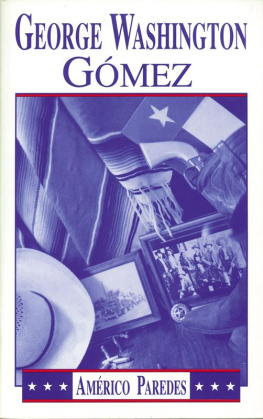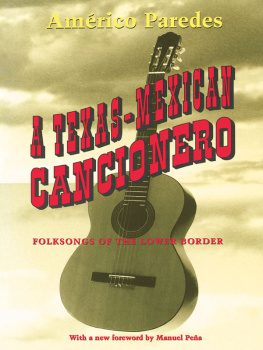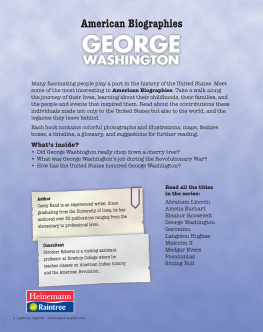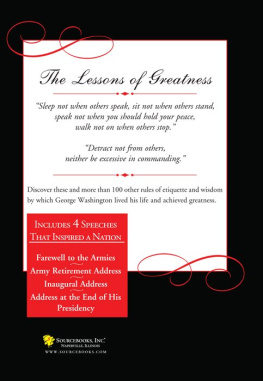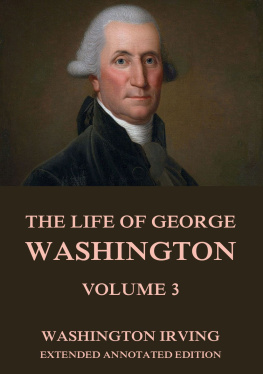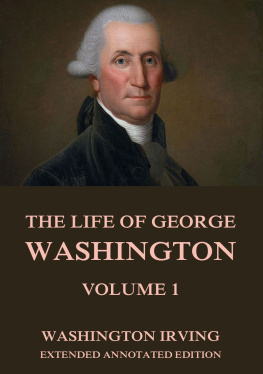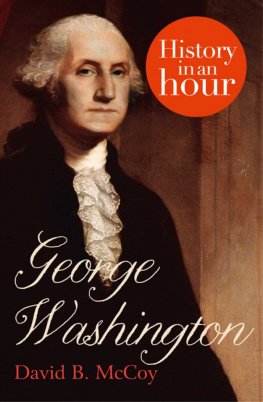Americo Paredes - George Washington Gomez: A Mexicotexan Novel
Here you can read online Americo Paredes - George Washington Gomez: A Mexicotexan Novel full text of the book (entire story) in english for free. Download pdf and epub, get meaning, cover and reviews about this ebook. year: 1990, publisher: Arte Público Press, genre: Detective and thriller. Description of the work, (preface) as well as reviews are available. Best literature library LitArk.com created for fans of good reading and offers a wide selection of genres:
Romance novel
Science fiction
Adventure
Detective
Science
History
Home and family
Prose
Art
Politics
Computer
Non-fiction
Religion
Business
Children
Humor
Choose a favorite category and find really read worthwhile books. Enjoy immersion in the world of imagination, feel the emotions of the characters or learn something new for yourself, make an fascinating discovery.
- Book:George Washington Gomez: A Mexicotexan Novel
- Author:
- Publisher:Arte Público Press
- Genre:
- Year:1990
- Rating:3 / 5
- Favourites:Add to favourites
- Your mark:
- 60
- 1
- 2
- 3
- 4
- 5
George Washington Gomez: A Mexicotexan Novel: summary, description and annotation
We offer to read an annotation, description, summary or preface (depends on what the author of the book "George Washington Gomez: A Mexicotexan Novel" wrote himself). If you haven't found the necessary information about the book — write in the comments, we will try to find it.
George Washington Gomez: A Mexicotexan Novel — read online for free the complete book (whole text) full work
Below is the text of the book, divided by pages. System saving the place of the last page read, allows you to conveniently read the book "George Washington Gomez: A Mexicotexan Novel" online for free, without having to search again every time where you left off. Put a bookmark, and you can go to the page where you finished reading at any time.
Font size:
Interval:
Bookmark:


This volume is made possible through a grant from the National Endowment for the Arts, a federal agency.
Recovering the past, creating the future
Arte Pblico Press
University of Houston
452 Cullen Performance Hall
Houston, Texas 77204-2004
Photo by Mark Pin
Paredes, Amrico
George Washington Gmez / Amrico Paredes.
p. cm.
ISBN 978-1-55885-012-5
1. Mexican AmericansHistoryFiction. I. Title.
PS 3531.A 525G4 1990
813.54dc20
94-6919
CIP
 The paper used in this publication meets the requirements of the American National Standard for Information Sciences for Permanence of Paper for Printed Library Materials Z39.48-1984.
The paper used in this publication meets the requirements of the American National Standard for Information Sciences for Permanence of Paper for Printed Library Materials Z39.48-1984.
Third Printing, 1994
Second Edition, 1993
Copyright 1990 by Amrico Paredes
Printed in the United States of America
11 12 13 14 15 16 17 13 12 11 10 9 8 7 6
My thanks to Ramn Saldvar and Ricardo Romo for their encouragement, and to Rolando Hinojosa for taking the time to write the Introduction. And a special word of appreciation to my co-worker of more than twenty years, Frances Terry, whose knowledge of the ways of word processors (still a mystery to me) transformed an archeological piece into a presentable manuscript.
Contents
Some thirty years ago, around 1958, on the corner of Eleventh and Elizabeth, Brownsville, Texass main drag, stood Daddy Hargroves bookstore. It was the only store of its kind then, and my sister Clarissa and I walked downtown to buy (each) a copy of Amrico Paredess With His Pistol In His Hand. Hargroves had dedicated its front display window to the book, a work by a hometown boy who had made good, so to speak.
Paredes, however, was not an unknown quantity in his hometown: hed been born and raised there, hed graduated from Brownsville High and from the local community college once known as Brownsville Junior College. Added to this, the Paredeses on both sides of the river had lived and worked in the area, el Ro Abajo, since the 18th century. And, as many Lower Rio Grande Valley families, we were and are blood-related. So, we had to buy the book, although it wasnt an obligacin where we bought Pistol because of friendship or blood kin, however. We knew him, and we knew of his work.
As a youngster, Amrico had published poetry in Los lunes literarios in the San Antonio, Texas La Prensa, in The Brownsville Herald, and elsewhere, but his latest effort had come when its author was a man, un hombre hecho y derecho: a World War II veteran, a former reporter for the Stars and Stripes in Japan, an administrator for the international Red Cross in China and Manchuria, and the holder of a baccalaureate, a masters, and a doctorate from The University of Texas.
The degrees, by the way, were earned in quick order while at the same time he and his wife, Amelia, were raising a family.
Pistol, of course, is a scholarly work which has stood the many tests of time. It is also a work which very early influenced many Texas Mexicans and others who followed his example as teacher-scholar-writer. As musician, too, but Ill touch on that in a minute. Pistol remains also as one of the most enduring of U.T. Press publications.
The present work, George Washington Gmez, was started in 1936 and finished in 1940. Its a first draft, and it should be seen and appreciated as an historical work, not as an artifact. Between times, from 36 to 40, Paredes continued his work on the Herald and would stop writing to devote time to his other love: music. The manuscript would be set aside from time to time while he practiced 8 to 10 hours on the piano. The guitar study continued too, as did his singing. Aside from working on both the English and the Spanish versions of the Herald, he also drove a delivery van and held other jobs until he could attend Brownsville Junior College.
A picture of feverish activity, then, but George Washington Gmez, sin prisa pero sin pausa, without haste but without rest, was being worked on. It is a dated work, but not in the pejorative sense: it is dated authentically, a first draft of a work set against the Great Depression, the onset of World War II in Europe, and set also against the over 100-year-old conflict of cultures in the Lower Rio Grande Valley of Texas, not far from where the Rio Grande empties into the Gulf.
Obviously, the manuscript could have been rewritten for these times; to have done so, however, would have damaged its integrity. Amrico Paredes is too honest a writer to force history into some rigid mold or point of view, and so George Washington Gmez is published as written, and we are the better for it: the 30s are not seen through the prism of nostalgia, that half-sister of debased romanticism, but rather through the eyes of a young writer, true to the times, to his family and himself, and, ultimately, to us, the readers.
| Rolando Hinojosa Austin, Texas |
George Washington Gmez
LOS SEDICIOSOS
THE SEDITIONISTS
It was a morning late in June. The flat, salty llano spread as far as the eye could see ahead and to the right. To the left it was bordered by the chaparral, which encroached upon the flats in an irregular, wavering line. Along the edge of the chaparral wound the road, and down the road four Texas Rangers were riding. Their horses hooves stirred the flour-fine dust, and it rose and covered their beards, penetrated down their shirt collars despite the blue bandanas around their necks, lay in a thin film on their rifle-stocks and the big handles of their revolvers. One was a middle-aged man with a John Brown beard; two were sour-looking hardcases in their thirties; the fourth was a boy in his teens, with more dust than beard upon his face. At first sight one might have taken them for cutthroats. And one might have not been wrong.
On the road ahead a cloud of dust came into view. In the middle of it there was a buggy drawn by a pair of smart-stepping mules. Two men were in the buggy, and one of them had a rifle cradled in the crook of his arm. The driver was sitting on the right, and even at that distance the Rangers could see that his face was a very dark brown. They spurred their horses into a lope and strung out to surround the buggy, but the driver edged his vehicle against the chaparral until his side was scraping the thorny huisache bushes. The middle-aged Ranger cursed under his breath as all four of them came up on the riflemans side of the buggy.
The rifleman, a sallow, skinny runt of a man, had shifted ever so slightly so that his gun barrel was pointing directly toward the Rangers. The driver was a much bigger man, with Negroid features; he was holding the reins in his left hand. His right hand was out of sight. Hello, MacDougal, the rifleman said, his sharp little nose twitching in what might have been a smile. Old man Keene, he paying you extra these days?
Well, if it aint Lupe, said the middle-aged Ranger. Whose money are you taking lately?
Nobodys.
Whatcha got there?
Groceries, replied Lupe. Then in Spanish to the driver, Show him, Negro.
S, cmo no, said El Negro. He reached back with his left hand and lifted a corner of the tarp covering the back of the buggy. There were some parcels underneath, and several boxes of soap.
Whatcha gonna do? asked MacDougal, pointing at the soap boxes with his quirt. Take a bath every day?
Lupe laughed shortly and after his laugh there was a silence. El Negro dropped the corner of the tarp and put his left hand back on the reins. The three younger Rangers played with their saddle pommels. Their light-colored eyes shifted from MacDougal to Lupe and back to MacDougal. MacDougal was looking into Lupes face; Lupe was looking at MacDougal but he was also seeing the other three. Finally MacDougal said, Okay, Lupe, see you some other time. He spurred his horse and the other three did likewise. The buggy continued on its way until it was hidden from view by a bend in the road.
Next pageFont size:
Interval:
Bookmark:
Similar books «George Washington Gomez: A Mexicotexan Novel»
Look at similar books to George Washington Gomez: A Mexicotexan Novel. We have selected literature similar in name and meaning in the hope of providing readers with more options to find new, interesting, not yet read works.
Discussion, reviews of the book George Washington Gomez: A Mexicotexan Novel and just readers' own opinions. Leave your comments, write what you think about the work, its meaning or the main characters. Specify what exactly you liked and what you didn't like, and why you think so.

